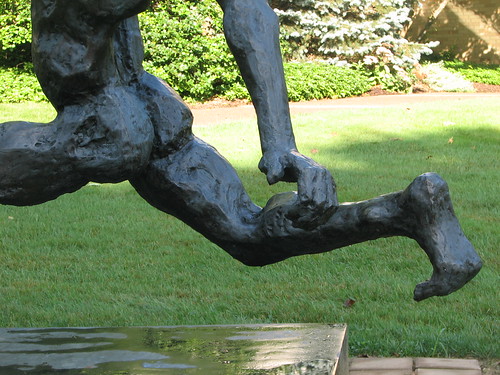 Although we probably already have enough "models of care" to last a lifetime, I think we would do well to focus on one simple abbreviation: ADTO, or Assessment-Diagnosis-Treatment-Outcome. This model could, quite simply, save millions if not billions of dollars for health care consumers. But before it can do so, it needs to become a foundation for researchers, clinicians, and patients alike.
Although we probably already have enough "models of care" to last a lifetime, I think we would do well to focus on one simple abbreviation: ADTO, or Assessment-Diagnosis-Treatment-Outcome. This model could, quite simply, save millions if not billions of dollars for health care consumers. But before it can do so, it needs to become a foundation for researchers, clinicians, and patients alike.
Across the continuum of health care, our goal as clinicians should be reliability, consistency and reproducibility. There should be a scientific method-based foundation for health care. But even if we have this, patients need to also have it as their accepted community standard of care.
So what does ADTO mean to patients? And why is it important?
 The phrase comes up regularly in patient care: "There is not one treatment approach that will work for all patients". This then leads to the inevitable perceived need for an "eclectic treatment approach".
The phrase comes up regularly in patient care: "There is not one treatment approach that will work for all patients". This then leads to the inevitable perceived need for an "eclectic treatment approach".
Of course, the more "tools in your toolbox", the better a clinician you are believed to be. Ugh.
I hear this regularly in both clinical and educational settings. You know what? I disagree. Completely. There is one approach that applies to all patients. It is highly effective, and it is critical to clinical success.
It's name? Science - and more specifically, clinical reasoning and critical thinking.
 We are now 13 days into a government shutdown in the United States. It is hard to imagine that any group has the power to simply "shut down" governmental operations. Worse yet, it is even harder to imagine that any group can do so while pushing an agenda counter to legislation that has already passed into law. But I digress.
We are now 13 days into a government shutdown in the United States. It is hard to imagine that any group has the power to simply "shut down" governmental operations. Worse yet, it is even harder to imagine that any group can do so while pushing an agenda counter to legislation that has already passed into law. But I digress.
Politics in the United States have reached new levels for acrimony, disrespect, and a general disdain for the desires of the constituency. What is most annoying - and, frankly, downright disgusting - is how legislators can claim to quote the values of the Constitution while failing to provide context in the process. But as we all know, words without context bear greater power for instilling fear - and fear is a great motivator.
So while we all wait to see if the country will go back online, it's time for Episode 77 of the Rhubarb Report.
 Function. It is the holy grail of physical therapy. We focus our efforts on understanding an individual's function - and how to make them function better.
Function. It is the holy grail of physical therapy. We focus our efforts on understanding an individual's function - and how to make them function better.
Anatomy and physiology are taught to provide us with the foundations of function. However, both are traditionally taught as a mess of rote memorization of muscle origins and insertions, innervations and actions.
What is lost in the mix is the big picture view - that "Form Follows Function". If we can understand the function of the human body, the dynamic entity that it is, then the anatomical foundations make far more sense. This requires teaching functional anatomy based on, imagine this, function!
 It is a phrase that will put a smile on your face and warmth in your heart no matter what the context:
It is a phrase that will put a smile on your face and warmth in your heart no matter what the context:
"Welcome home".
It is a phrase that I heard repeatedly over the past 5 days. Why? As time would have it, 2013 is the 25th anniversary of my graduation from Queen's University. That being the case, it was time for a homecoming reunion.
I can tell you with great certainty from my experiences while on campus that they take reunions seriously at Queen's. This year was no different.
 The last few weeks have been busy weeks, indeed. I've not been writing as much or as frequently. Oh, the ebb and flow of time while teaching a class in the fall semester and attempting to put some focus into some more expansive writing projects.
The last few weeks have been busy weeks, indeed. I've not been writing as much or as frequently. Oh, the ebb and flow of time while teaching a class in the fall semester and attempting to put some focus into some more expansive writing projects.
But do not fear, oh faithful readers. It is a momentary episode of radio silence. Trust me, the thoughts and ideas are percolating!
And, of course, there is always rhubarb to be found on a daily basis. So let's forge ahead with another episode of the Rhubarb Report – number 76, to be exact.
 The sport activity has to be the problem. That in itself has to be related to the cause of my low back pain, even without a specific mechanism of injury. Oh, it has to be because I [insert here: am not flexible enough, have a weak core, or any number of deficits].
The sport activity has to be the problem. That in itself has to be related to the cause of my low back pain, even without a specific mechanism of injury. Oh, it has to be because I [insert here: am not flexible enough, have a weak core, or any number of deficits].
These are the words of countless active patients (and the clinicians that work with them) that suffer from low back pain. Both groups will create magical scenarios for the onset of an episode of low back pain with mechanisms that have little to no chance of actually existing. But they sure sound good, don't they?
Sometimes, it’s the daily stuff that is most important. With that said, let's take a look at the Case Of The Sitting Runner.
 "Running Injuries: Etiology And Recovery- Based Treatment" (co-author Bridget Clark, PT) appears in the third edition and fourth editions of "Clinical Orthopaedic Rehabilitation: A Team Approach" by Charles Giangarra, MD and Robert C. Manske, PT.
"Running Injuries: Etiology And Recovery- Based Treatment" (co-author Bridget Clark, PT) appears in the third edition and fourth editions of "Clinical Orthopaedic Rehabilitation: A Team Approach" by Charles Giangarra, MD and Robert C. Manske, PT.
 Allan Besselink, PT, DPT, Ph.D., Dip.MDT has a unique voice in the world of sports, education, and health care. Read more about Allan here.
Allan Besselink, PT, DPT, Ph.D., Dip.MDT has a unique voice in the world of sports, education, and health care. Read more about Allan here.
 Top 5 finalist in three categories: "Best Overall Blog", "Best PT Blog" and "Best Advocacy Blog".
Top 5 finalist in three categories: "Best Overall Blog", "Best PT Blog" and "Best Advocacy Blog".